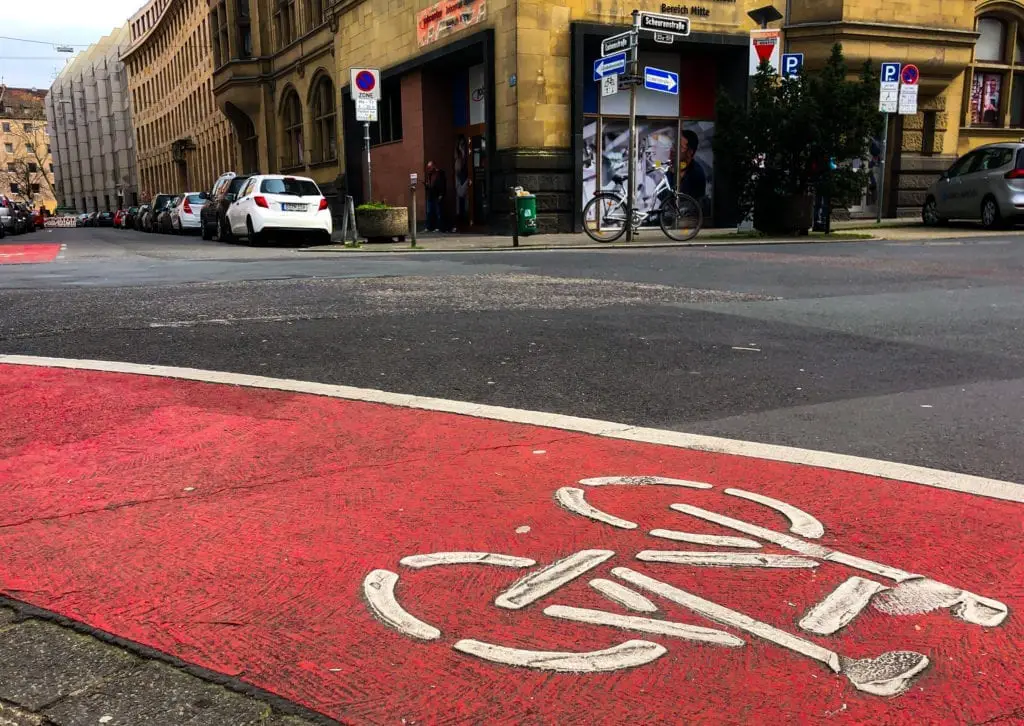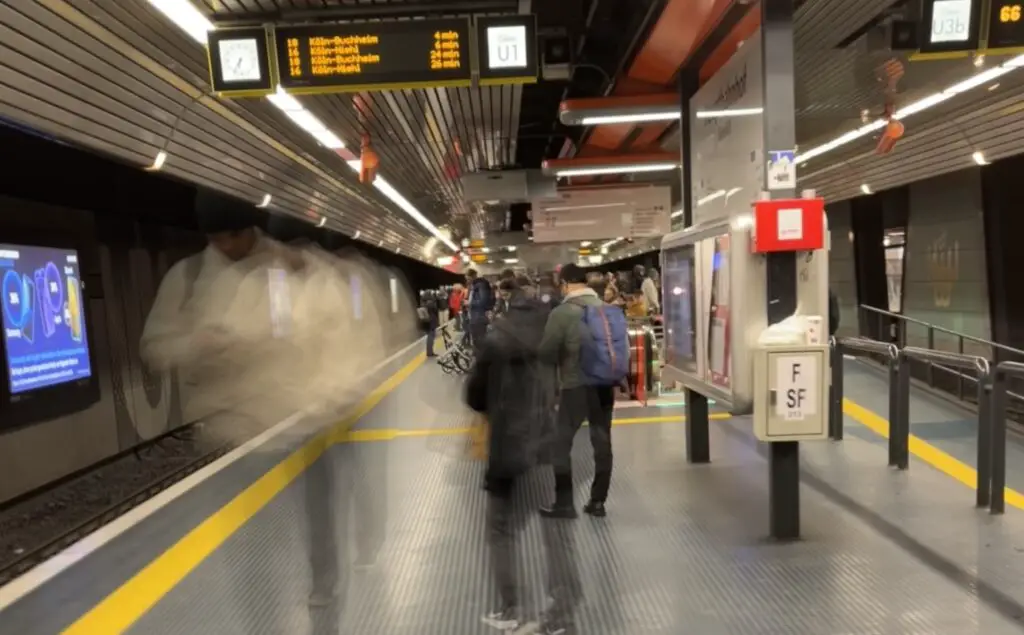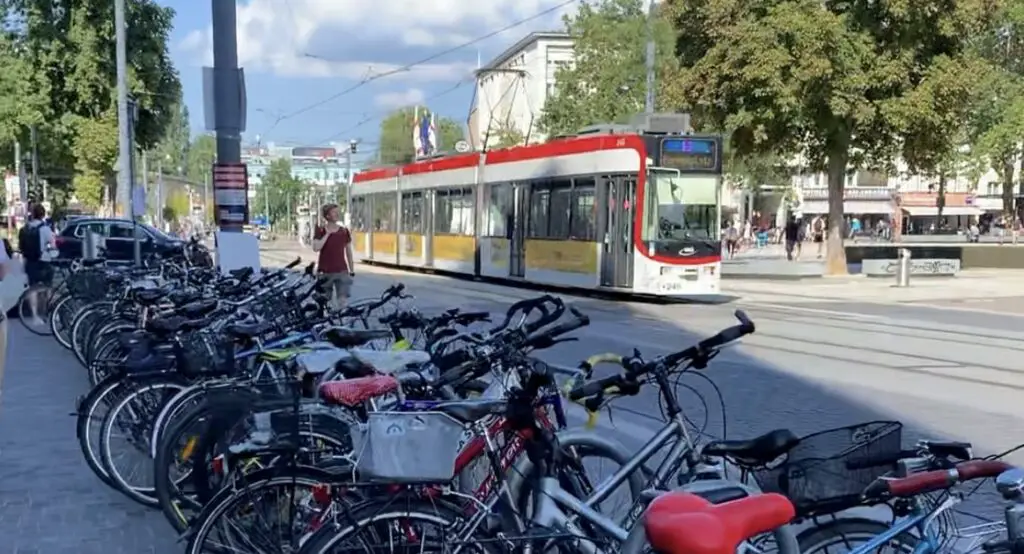For those of you moving to Germany for the first time, the culture of environmental consciousness may surprise you!
As someone who moved from the USA to Germany, I noticed this consciousness in 3 main areas: Transportation, Waste Systems, and Energy. You can follow my 3-part sustainability series by searching “Living Sustainably in Germany” in the search function on lifeinduesseldorf.com. I hope you enjoy it! 😊
Alternatives to Driving in Germany | German Transportation: An Overview in Four Points
There are many alternatives to driving in Germany that we will go through in the section below.
Cars in Germany
As of 2022 in the US, around two-thirds of citizens rely on cars as their main transportation. It is fascinating to compare this to Germany, where in 2022, more than 10 billion people utilized German public transit and the many alternatives to driving in Germany.
“As an American foreigner used to driving her car every day from point A to point B, switching to public transit was… for lack of a better phrase: a massive FLOP! Learning to get around without a car was alien to me, and at first glance, it seemed so complex and unattainable.”
According to a Bloomberg article, the ratio of car ownership in the US to Germany is 766 to 585.
Additionally, in the US the share of all trips by car is 83%, while in Germany it is 58%.
To be clear, there is no absence of car use in Germany, but there is a focus on diversifying transportation methods to mitigate the harmful effects of driving cars: carbon emissions, accidents, traffic jams in cities, etc.

When moving to Germany it is important to consider the environmental impact of your transportation, but also how economically viable your choices are. For those interested in car ownership who have the means, an electric vehicle is a great option that allows for more freedom of movement while reducing emissions. Looking into buying a used vehicle may also be a great option for you as well. It is also important to consider the costs associated with car ownership, from taxes to upkeep to parking, and to look at the driving rules including what you need to get your driver’s license here.
“From personal experience, I can say that I was shocked when I found out that a liter of gas in Germany costs roughly 1.74 Euro, which is equivalent to a $7.07 gallon of gasoline in USD. As a student on a budget in Germany, I have found that public transit is the cheaper and more accessible way to get around by far.”
Public Transit in Germany
It is known that using public transportation is more environmentally friendly and fuel-efficient because automobiles emit high amounts of carbon dioxide with every ride, and often only carry 1-2 people per vehicle. While vehicle travel is responsible for 15% of total global CO2 emissions, rail travel only accounts for 1%. For this reason, I highlight train travel as an economical and environmentally friendly choice!
The main supplier of trains in Germany is Deutsche Bahn, a company that manages both long- and short-distance trains. Deutsche Bahn in Germany has taken this sustainable argument seriously and furthered it by assuring that “all Deutsche Bahn long-distance trains run on 100% green electricity.” They have also had past initiatives to make using public transit more accessible, for example, the 9 euro local and regional transport ticket in the summer of 2022.
At present, the monthly local and regional transit ticket, the “Deutschland Ticket,” costs only 49 euros!
“For endless access to local and regional transit all over Germany, I’ve found it to be a cheap and reliable way to travel the country without having to navigate different tickets in different Bundesländer!”
Longer distance trains, normally controlled by Intercity Express (ICE), can vary in price, but typically the earlier one buys a ticket before the travel date, the cheaper it will be. There are also some cheaper budget long-distance trains, for example Flixtrain. Even for those who own cars, local rail transit in the form of U-Bahns, S-Bahns, and Straßenbahns can be a compelling option given the difficulty of finding parking in cities and the daily traffic during rush hours.

Compare this with the high costs of paying for a car and the cost of gas and one can see why public transit is a positive economic and environmental choice for many folks!
“A final quick word to the wise: be sure to always use the Deutsche Bahn or Google Maps app when planning your travel! It is crucial to know when your trains are arriving, departing, and connecting… or if they are late (😬). It will save you many long waits at train stops.”
Cycling in Germany
In Germany, 30% of citizens bike to work, according to a 2020 study done by the Transportation Ministry. Additionally, the shares of trips completed with cycling in Germany is 10 times the cycling shares in the United States. And it shows. The layout of the city, from bike lanes to reinforced bike lots, to just the thousands of bikes one sees when they wander a neighborhood— all point to high bicycle use.
“When I first moved to Germany, I quickly realized that my greatest fear was not the cars on the road, but the bikes in the bike lanes. One wrong step into the lane could have 10 bike bells ringing angrily at you.”
Germany is known for having well-connected bike lanes alongside pedestrian walkways and vehicle roads. This method of road segmentation is safer than the “road sharing” that we often see in the US. Biking is a great source of exercise that promotes health and longer life, it reduces inner-city traffic issues. It is much easier to “park” than a car.

Owning and maintaining a bike can be expensive, but many cities also offer rental bike services for a cheap price for less regular use!
“Full disclosure: I have not yet worked up the courage to bike in Germany. Coming from a town where biking on winding country roads was dangerous, I have never felt confident enough in my bike skills to share the road with German “professionals.” I aspire to bike more in the future because it is great for your body, and gets you places faster than walking!”
Walking in Germany
As mentioned in the cycling section above, the design of urban transportation and movement is crucial to the acts of cycling and walking. Having spacious sidewalks, pedestrian traffic lights, and reduced urban speed limits all help a city become more walkable and welcoming.
“What I have come to find in Germany is that even huge cities like Cologne or Berlin feel smaller because of the decentralization of urban centers across the city quarters. Small supermarkets and shopping areas spread across the cities mean each quarter functions like its own small city, and meeting your needs can mean walking 15 minutes or taking a tram a short way.”
Much like cycling, walking has its ups and downs. It is a great source of subtle exercise, it’s free (😄), and it reduces city traffic on roads, aiding in lowering emissions. However, it can be slower than biking, and also very unpleasant when the weather is bad.
“I can’t tell you how many times I have wiped out on an icy street on my way to class or arrived at a meeting dripping in sweat all because the weather is not so friendly to walkers. However, as the German phrase goes “Es gibt kein schlechtes Wetter nur schlechte Kleidung.” (There is no bad weather just bad clothing.) A good example of this is my selfie below, taken during my daily walk to the train station… during a snowstorm.”

In conclusion, all of these ways of getting around your new German neighborhood are great alternatives to driving in Germany, with a lot of flexibility for economic barriers and environmental consciousness!
Reducing our carbon footprints with alternative modes of travel is an easy step we can take in the right direction! 🌿🍀🌳












